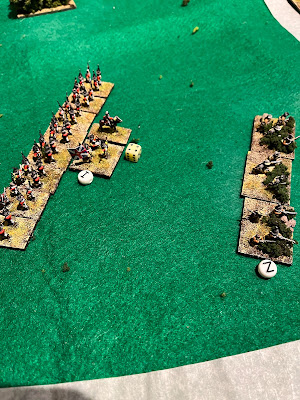Well that was a turn up for the books. In the third remote game of Hubbardton the Jolly Broom Man (British) faced off against the Two Daves (David in Suffolk and Napoleon Dave) playing the Americans. Max Foy joined as an observer.
JBM elected to start the grenadiers and 24th Foot in column of march on the road, with the Lights in line. The plan was to race towards the road junction seize it and turn the American flank. For the first couple of turns the Americans won the initiative. Most of the American units retired over the fence, but David in Suffolk opted to keep the riflemen on the British side of the fence to take some shots at the Brits whilst they were still in column.
Fairly safe you might think. But then the British won the initiative a couple of turns running, and the grenadiers, by now at the road junction, formed line and threatened the riflemen with a bayonet charge in the flank. Disaster for the Americans! They took a number of hits and routed, but not fast enough to stop the British keeping in combat range. A second round of combat saw the rifles further, across the fence, with half their bases lost and several DPs.
On the American right, Napoleon Dave opted to stick to the fence line and exchange musket fire with the British Lights in skirmish order. Hits were inflicted on each side but not enough to cause either any real problems. But the Lights were tying down two American units.
The grenadiers continued across the fence to attack the 11th Massachusetts Regiment who had retired back from the fence to form a line conforming to the British attack. Things were looking good for the British. They had achieved one of their two objectives (seize the junction) and were on the way to the second (seize the hill). Unfortunately, the grenadiers had picked up DPs with each of their combat turns and wheeling. The American commander on the left (DiS) saw the disorder in the British lines and took the chance to chase them off the ridge. Down the hill came the Americans, with a sharp crack of musketry and a whoop. The weary, disorganised grenadiers turned to run down the hill. Here the initiative stayed with the Americans and they charged the retreating grenadiers again. Disaster for the British who ended up back across the fence and down from 8 bases to 1 with a stack of DPs to rally off.
Only the presence of the 24th Foot, to the left of the grenadiers, dissuaded the Americans from following up further. The 11th and 24th traded shots, as did the other New Englanders and the British Lights on the far flank. Back on the road, the Hessians arrived, but too late to do anything.
By the end of turn 9, the British held the road junction and the Americans held the hill. Honours even? Perhaps not. The British had lost 9 bases to the Americans 3. Each lost British base is worth 1.5 points to the Americans in this scenario, and the American losses only 1 point each. So the Americans were better off in strategic terms. The Americans were free to retire from the field (though not by the easiest route), but could the British bear another encounter like this?
This is a very difficult scenario for the British. With such a limited number of turns they have to advance quite a long way and fight. The problem is the urgency to 'get there' has to be balanced against the impact of disorder. Disorder Points impose a heavy burden on troops in combat and this is what did for the grenadiers. A tough choice to make.
The whole session took 3 hours, but this included a fair amount of time with me trying to stop a a repeating echo. The cause: I hadn't muted the second laptop in the room. Doh! There was also a goodly amount of very enjoyable chat after the game finished. So all that remains is for me is to thank the chaps who participated and observed this evening. I think it's time now to move to a different war.






